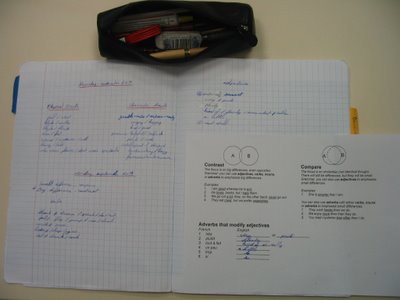And another thing…

Lycée Francois Magendie
One of the classes I observed in Bordeaux at the Lycée Francois Magendie furnished me with a great example of how to read the riot act, à la francaise, to a class of upstart underclassmen...this is roughly how it went down.
It doesn’t take long for Madame X to become disenchanted with her class. Right off the bat she observes that a handful of students have not brought their books, a couple more do not have their cahiers. (It’s worth noting here as an aside, that not even the most irresponsible French kid fails to bring writing materials.) This prompts a scolding leveled at the offenders but clearly intended for the benefit of all present. The gist of it runs along the lines of “we’ve been at this a month now…I shouldn’t have to be reminding you that it is impossible to do your work without your materials.”
Madame X is a slim, middle-aged woman with short hair and narrow spectacles. Even though she wears jeans, there is a stylish air about her, it could be the dangling earrings, the scarf draped loosely over her shoulders and about her neck. She paces across the front of the room like a caged panther.
Then swiftly and without fanfare she begins the lesson, They have been given an ad from an English newspaper, The Guardian. The bold print asks, “Are you ashamed of your English?” It’s selling one of those prep-for-success kind of books. Madame X peppers the class with questions about the ad. Things are going reasonably well, students are raising hands volunteering answers, and then the class founders on a question that hinges on knowing whether certain English words in the text are nouns or adjectives. What are some positive nouns in this text?One student after another fails to deliver the expected answer. “Better?” volunteers one. Is that a noun? “Comprehensive?” says another? What is that word?Doesn’t anyone know what a noun is? Didn’t you do your homework?
Madame X seems surprised and bemused. She tells the class to get out their homework which presumably contains work illustrative of the point in question…there is a noticeable lack of activity in response to her prompt, noticeable to me and to her. I can see the lines along her jaw and neck tighten. She begins circling the room confronting individual students, Did you do the homework? She demands a yes or a no from each one. A couple of students attempt to mumble something affirmative. In both cases Madame X refuses to take their word for it and demands to see the work. I did it, but I didn’t write it down, is the barely audible reply. Then it isn’t done, is it? Not properly. She continues remorselessly around the room until she has extracted the truth from every one of them.
Having thus assembled the evidence before their eyes in convincing and meticulous fashion she then proceeds to explain to them the significance of this evidence for their miserable lives. If allowed to continue, this sort of thing can only lead to catastrophe for each of them, she says. This is not serious work. You’re not in college (middle school) anymore, are you? You’re in lycée. She heats up. She switches to French. It is now a tirade. She alternately punches the volume and then turns on her heels to go back to her desk as if she were about to wash her hands of the whole lot of them. There are some here who want to learn. It is a pity…you have no right to deny them...most of the kids keep their heads low but that does not save certain individuals from being directly challenged,.. show me your work…this isn’t serious work…do you call this serious work? you’ve copied this wrong from the board…were there two “l’s” in this word? …no, you must concentrate, you must try harder and do you work properly. When she has the entire class cowed and silent, she finally relents a tiny bit. Madame X looks at me, we make eye contact. She appears genuinely distressed about what is happening and about the fact that I am witnessing it. She takes a breath and then takes a different tack. “we” (the school, adults in general, me and her perhaps?) are not against you; rather, you are your own worst enemies. Your very futures hang in the balance, but it is you who must accept responsibility for your own future…she is impassioned and earnest as she advances this line of argument. It occurs to me that she really means it, and that while she might be good at sarcasm, she doesn’t necessarily prefer it to more civil discourse.
And then as sometimes happens in the classroom, a student delivers her an opening by which she can reestablish some sort of rapprochement with her class. A hand goes up. “What does this word mean? asks a girl right in front of me. Madame X appears to stifle an impulse to reprimand her for deflecting her tirade. She goes to the girl and asks to see the word. The girl points at it. Madame X’s demeanor changes perceptibly. this is a good question. Can you say it louder, please?
“What does “wordpower” mean?”
What is word power? Do you know this word? she asked them.
Silence…not surprising given the circumstances.
Madame X writes it on the board. It’s a mot composé (compound word) the sort of thing that happens a lot in English. Look.
She writes “word” and “power” separately. What are these words? Nouns or adjectives? I tense up, we’re back to parts of speech. From the class come a couple of voices, soft and ever so tentative, “Nouns…”
That’s right. she says. I’m a bit surprised that she isn’t making a bit more of the victory, such as it is, but she clearly has no intention of celebrating until there is something more substantial to feel good about. She gestures at “word”. But look here where this word sits, just before the noun “power”. She pauses as if recollecting something. Do you know what power is?
One kid offers the French word “pouvoir” but Madame X doesn’t even look at the boy. She isn’t the least bit interested in French, this is after all an English class.
More silence. I suppose you know who Jacques Chirac is, don’t you? How about George Bush? Heads nod. They have a lot of power, political power. They can do what they want with the world, can’t they? I notice a mischievous smile on her face. There are many kinds of power. I have power don’t I, power over you…I can make you do things. The smile is broader now, she is conceding to them that she knows her own power is contingent, but is a tacit concession probably lost on most of the kids…I can try at least…but you know, I don’t want power over you. I’d rather have power with you. As she says this she extends her arms outward in invitation. But it is decidedly not an invitation to a group hug; it is, rather, a proposition, a notion founded on bedrock Republic principles. She is not asking them to love her; she is imploring them to join with her in doing the work that needs to be done… a distinction with a real difference.
She then turns back to the board. Look at where this word sits, right here before the word “power”. What do we call words that come before nouns and modify them?
This time a small chorus answers, “Adjectives.”
That’s right! She is animated. She draws an arrow from “word” to “power”. It’s a noun normally but here it functions as an adjective. It tells you what kind of power we’re talking about. Wordpower. Do you understand?
More nodding.
Madame X looks at the girl who posed the question and regards her with approval…and gratitude, perhaps? She has recaptured the golden thread, la ligne directrice, which seemed irretrievable a few moments ago. There is in the class a palpable sense of relief, something akin to a collective epiphany that Madame X is both terribly smart and terrible, and that the former trait is far more desirable to spend time with than the latter. The bell sounds. Madame pauses. It is up to her to dismiss them. She looks at them gravely and in French she warns against the folly of repeating today’s mistakes. There is suspense in the room, the clock is ticking, could she be heating up again? “You have lost much time today. I did not lose it. You did. Come prepared the make up for lost time next time. If not…measures will be taken. She falls silent and inclines her head.
Everyone gathers their things. The students are gone in a matter of seconds.
….
A few days later, I’m standing in front of a class of secondes (sophomores). I look sternly at a young woman and I hear myself say, “This is not serious work. You’re in not college anymore, are you?” She is visibly contrite. “Do you understand?” She nods. I go on with the lesson, but I am strangely elated by the way those words came to me all at once, a set piece. I feel armed - not dangerous - but armed and ready.
Permission to impose myself upon my students…?
Permission granted.
Thank you Madame X.
K




 prompted Tess to ask me,
prompted Tess to ask me,













































